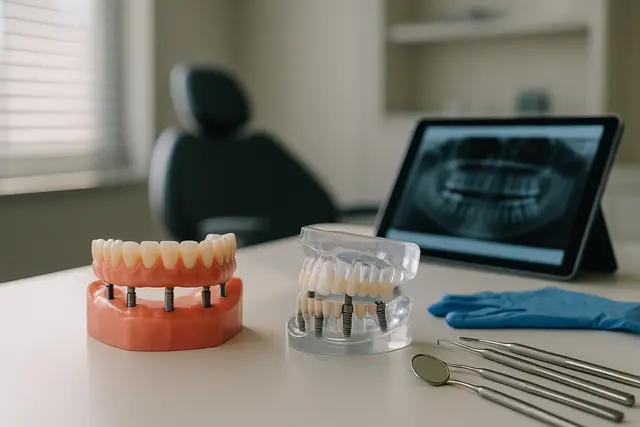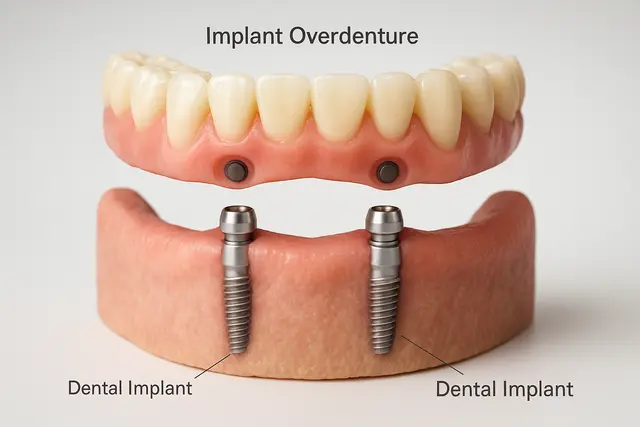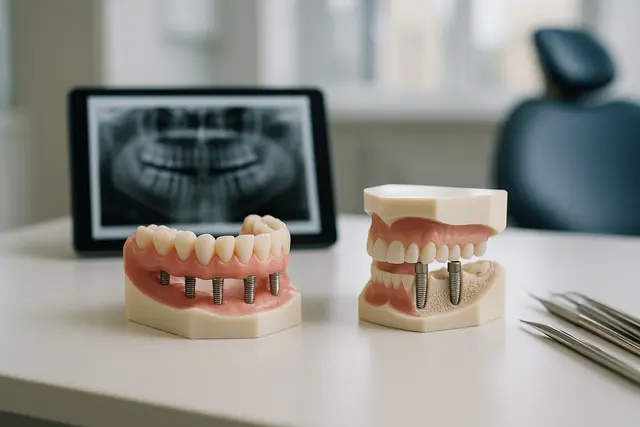Prosthodontics
6 min read
Jul 24, 2025
Can You Eat Anything With Dental Implants? Let’s Break It Down
If you’ve recently gotten dental implants, or are thinking about it, you’re probably wondering what you can eat and when. After all, food is a big part of everyday life, and the idea of enjoying your favorite meals again without worry is a major perk of implants. This guide breaks down everything you need to know about eating with dental implants, from the healing phase to long-term freedom at the dinner table.

If you're dreaming about biting into a juicy burger or crunching down on fresh apples again without a second thought, dental implants might just be your new best friend. But before you toss your dentures or swear off soup forever, let’s talk about what it really means to eat with dental implants and what kinds of foods are actually on the menu.
This isn’t just a story about teeth. It’s about freedom. Confidence. And yes, finally being able to eat normally again, without worrying about pain, slippage, or avoiding anything crunchier than mashed potatoes.
How Dental Implants Work and Why They Matter
A dental implant procedure isn’t just a fancy replacement tooth. It’s a small titanium post that’s placed into your jawbone where a missing tooth used to live. Once it heals and bonds with the bone, it acts like a rock-solid foundation for a crown (that’s the tooth-looking part). Together, dental implants and crowns function like natural teeth, and in many cases, feel even sturdier.
Unlike a denture, which just sits on top of your gums and can wobble around during meals, dental implants are designed to stay put. That means you can chew food, laugh, sneeze, and smile without worry.
What to Expect After Dental Implant Surgery
Now, we’d love to tell you that you can chomp into a rack of ribs right after the implant is placed, but let’s not get ahead of ourselves. After the initial implant surgery, your mouth needs time to heal. Think of it like a “soft opening” before the grand reopening of your bite.
During the first few days and weeks following surgery, you’ll need to be kind to your implant site. That means sticking with soft foods, keeping your mouth clean, and yes, avoiding certain foods that might irritate your gums and dental implants or disrupt healing.
Eat After Dental Implant Surgery With Caution
Immediately after surgery to place the implant, your mouth will likely be sore and sensitive. You’ll want to avoid hot foods, spicy foods, and anything that requires major chewing effort. Eating foods that are too hard or sticky too soon can cause the implant to fail or delay healing.
Some top soft dental options in the first 24 to 72 hours include:
Mashed potatoes
Yogurt and other dairy products
Smoothies (but avoid using a straw)
Scrambled eggs
Soup (warm, not piping hot)
It’s important to avoid using a straw during this time because the suction can disrupt the healing process and potentially damage your implants.
A Guide to Eating During the Recovery Period
During the weeks after surgery, your implant is bonding with your jawbone. This phase is crucial. Implants may feel stable, but they’re still getting comfy in their new home.
This isn’t the time to test your limits with crunchy foods or chewy bagels. It's best to avoid hard foods that could shift or stress the implant. Instead, stick to softer foods like:
Cooked vegetables
Rice and pasta
Soft meats like fish or shredded chicken
Oatmeal or soft cereals
Don’t worry, it’s not forever. Once the implants have fully integrated and the dentist gives you the green light, you’ll be able to eat normally again.
What Types of Food Can You Eat With Dental Implants?
Once you’ve healed, get ready for some good news: you can eat almost anything. Yes, really. You’ll be able to eat all the following foods you used to enjoy, without the fear of slipping dentures or painful chewing.
Here’s a quick list of foods you can reintroduce:
Crunchy foods like apples and carrots
Your favorite foods, from steak to tacos
Cold foods like ice cream (just let it melt a little)
Spicy foods, if that’s your jam
Even popcorn (just be careful of those rogue kernels)
Dental implants help restore full function, which means you can enjoy your favorite foods again without worrying about discomfort or damaging your bite.
Eat After Dental Implants Without Worry
Once you’ve completed the dental implant recovery, your new implant is stable, and your crown is in place, you’ll be able to eat normally with dental implants. In fact, most patients say they forget they even have implants. That’s how natural they feel.
You’ll be able to eat normally with dental implants, yes, even the foods you love that used to be off-limits with dentures or missing teeth.
That said, there are still a few commonsense precautions.
Avoid the Following Foods That Might Damage Your Implants
Just because you can doesn’t always mean you should. While dental implants are incredibly strong, they’re not invincible. The foods can damage your implants are best to avoid:
Very sticky foods like caramel or taffy (these can pull at your crown)
Hard foods like jawbreakers or unpopped popcorn kernels (neither of these foods is tooth-friendly in any situation)
Extremely hot foods that can irritate healing tissue
Crunchy ice cubes, your teeth and implants will thank you
Staying away from foods that can crack or stress your implant will help ensure your implants last a long time. Once the implants have fully healed and your dentist has confirmed everything looks great, you can return to a normal diet. You’ll be able to chew, bite, and enjoy your meals just like you did with your full set of natural teeth.
In fact, dental implants function like natural teeth in most ways. They can withstand most types of food, feel secure when you eat, and require very little special maintenance beyond good oral hygiene.
The Benefits of Dental Implants Go Beyond Just Food
Of course, getting dental implants isn’t just about eating foods without worry (though that’s a pretty great perk). Dental implants also help preserve your jawbone by stimulating it just like a real tooth root would. That prevents the sunken look that can come with missing teeth and denture use.
Dental implants also help improve your speech, boost confidence, and support your overall oral health.
Are You a Good Candidate for Dental Implants?
Not everyone is ready to jump straight into the dental implant procedure. You’ll need healthy gums, a strong jawbone, and a commitment to keeping your teeth clean. If you’ve got existing oral health issues or gum disease, your dentist or implant dentists might recommend treatment first.
Still, missing teeth can also affect your health, self-esteem, and even the way you chew food. So, if you're ready to eat with confidence again, it might be time to get dental implants.
Maintaining Oral Hygiene After Dental Implant Surgery
After getting dental implants, keeping your mouth clean is non-negotiable. Brush twice a day, floss gently around dental implants, and visit your dentist for regular checkups. Caring for dental implants properly is the best way to ensure your implants stay healthy and strong.
That includes cleaning around dental implants properly, just like you would with your natural teeth. Poor care can lead to infections or even cause the implant to fail.
What You Can Expect After Dental Implant Surgery in the Long Term
Most people find that long after dental implants are placed, they forget they even have them. With good oral hygiene and a smart diet, the longevity of your implants can span decades, even a lifetime.
So whether you’re enjoying popcorn during movie night (chew with caution), digging into crunchy foods at a summer BBQ, or simply able to eat breakfast without thinking twice, dental implants give you the freedom to live fully.
In short: once you’ve healed and followed your dentist’s advice, you’ll be eating your favorite meals with gusto. And that, my friend, is something to smile about.
What Foods Can You Eat After Dental Implant Surgery?
Right after surgery, you’ll need to stick to soft, soothing foods that don’t stress the implant site. Think mashed potatoes, yogurt, scrambled eggs, and smoothies (without a straw). Avoid hot, spicy, or crunchy foods during the first few days to support healing and prevent complications.
When Can You Start Eating Normally With Dental Implants?
You can return to a normal diet once your implants have fully healed and your dentist gives the green light, usually after a few months. At that point, you can enjoy everything from crisp apples to grilled steak, with no worry about shifting, pain, or biting power loss.
Are There Any Foods You Should Avoid With Dental Implants?
Yes. Even after healing, certain foods can put your implants at risk. Avoid sticky items like taffy, extremely hard foods like jawbreakers or unpopped popcorn, and chewing on ice. These can damage the crown or stress the implant and should be limited or avoided altogether.
Do Dental Implants Feel Like Real Teeth When Eating?
Absolutely. Once healed, dental implants are designed to mimic the function and feel of natural teeth. Most patients report forgetting they even have implants. You can chew, bite, and enjoy your favorite meals without the slipping or discomfort often associated with dentures.
Read Next
Related Posts

Prosthodontics
Implant Supported Dentures Overview
Missing teeth can impact more than just your smile, they can affect your confidence, comfort, and even your diet. Fortunately, modern dentistry offers a solution that’s both secure and natural-looking: implant-supported dentures. This innovative approach blends the stability of implants with the convenience of dentures to create a long-lasting, life-improving upgrade.
5 min read
Oct 29, 2025

Prosthodontics
Implant Overdentures Explained: The Hybrid Solution to Missing Teeth
Missing teeth can impact everything from your ability to eat to your self-confidence. While traditional dentures have long been a go-to solution, they often fall short in comfort and stability. Implant overdentures offer a modern alternative that combines the security of dental implants with the convenience of removable dentures, a true upgrade for those looking to reclaim their smile.
6 min read
Oct 29, 2025

Prosthodontics
Implant Retained Dentures Explained
Considering implant-retained dentures? You're not alone. As modern dentistry evolves, more people are turning to this secure, natural-feeling alternative to traditional dentures. This guide will walk you through what they are, how they work, and why they might be the solution you've been looking for.
4 min read
Oct 28, 2025
Don’t have time to research every dentist around you?
See why 30k+ patients trusted us